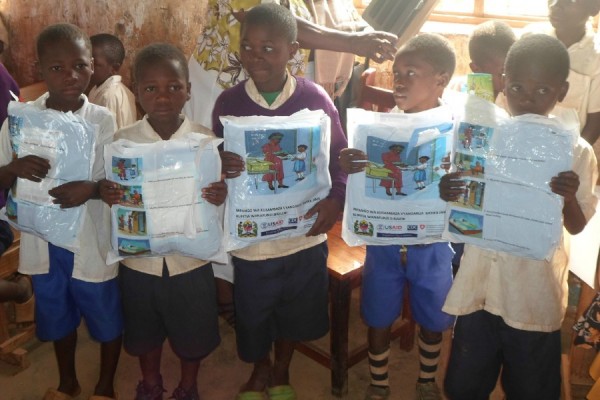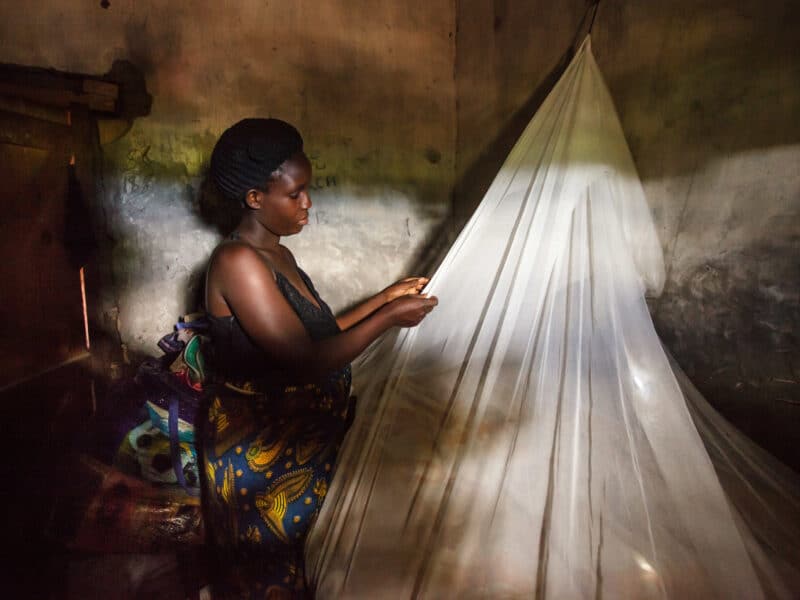For most kids around the world, long lasting insecticidal nets (LLIN) do not feature prominently on their school supplies list. This is not the case in Tanzania.
Students across southern Tanzania have received LLINs as part of the School Net Project, an initiative of the National Malaria Control Programme. Waziri Nyoni, Director of Programs at Tanzania Communication and Development Center (TCDC), explains, “Between August 12-21, the School Net Project distributed 500,000 nets in 2322 schools in Mtwara, Lindi and Ruvuma regions in southern Tanzania. This initiative requires a massive amount of organization, but we have excellent partners who are making sure it goes smoothly.”
Funded by the U.S. Agency for Development (USAID), the Johns Hopkins Bloomberg School of Public Health Center for Communication Programs’ (CCP) Tanzania Capacity and Communication Project (TCCP) is managing the behavior change communication (BCC) component of the School Net Project, and the Red Cross and RTI are overseeing the net distribution in partnership with the Tanzanian Ministries of Health and Education.
“My parents and I were very happy when I brought the net home,” says Kalini Abel enthusiastically. Kalini is an 11 year old girl who is in Class 5 at Salem Pre and Primary School in Mtwara. “We gave it to my brother since he was only one who did not have a net. My brother is now sleeping under the net every night!”
Research has shown that if every member of a household uses an LLIN properly, every night, the risk of contracting malaria is dramatically reduced. Many different approaches have been used to ensure full population coverage, but for the School Net Project, the NMCP determined that distributing nets through schools to students was a potentially effective approach. The goal is to distribute nets annually in alternate classes (i.e., class 1, 3, 5, 7 in primary school, and classes 2 and 4 in secondary school), so that every child brings home a new net for their family every other year.
“School children are agents of change,” explains Jacob Macha, Field Operations Manager at Tanzania Communication and Development Center (TCDC). “We believe that by giving them nets to take home, they will make sure nets are put in use and it will be more likely that households will adopt net usage behavior.”
TCCP created a broad BCC strategy to complement the net distribution and encourage use. Since June, radio spots have been aired regularly in the focus regions with messages preparing everyone for the upcoming net distribution. During the two-week period of the distribution, new spots are aired. Their messages include reminders for the children to bring their nets home, and messages about how to use and share nets. And once the distribution is complete, a third wave of radio spots will hit the air with messages about net use and proper care and repair behaviors.
In addition to the radio spots that are targeting the adult population, Pata Pata, a well-known children’s radio show is airing every Saturday with messages about using and caring for nets and the importance of sharing extra nets with households that don’t have them. Children in the focus regions are encouraged to listen to Pata Pata every Saturday as part of radio listening groups, led by volunteer leaders who have received discussion guides from TCCP. School teachers discuss and reinforce the messages of the show in class on Mondays.
“Pupils are were really impressed by Pata Pata stories and were all busy filling the puzzles on the comic brochures they received with nets,” says Mr. Joram, a teacher at Salem Pre and Primary school in Mtwara. “The distribution of nets in schools program is very efficient and convenient to all of us because […] pupils learn the importance of using of nets for prevention of malaria and now they receive nets [to put to use at home].”
“The net I had was not good [and] I was not comfortable sleeping without an effective net because I knew it was dangerous to me”, says Sara Mbunda, an 11 year old girl in Class 5 at Msamala primary school in Mbinga. “I asked my father to buy for me new net but he didn’t. I got this new net and I thank God my father said I should use it for myself.”
Learn more about TCCP and the School Net Pilot.





